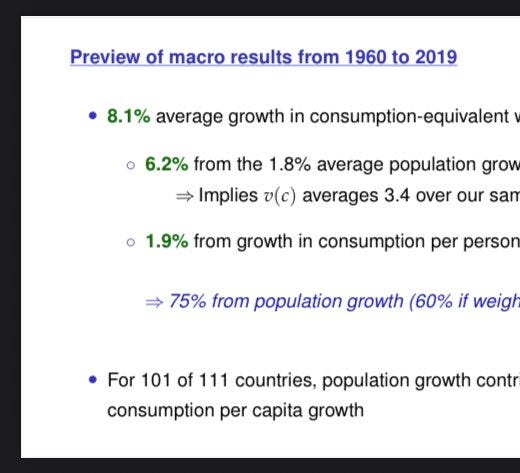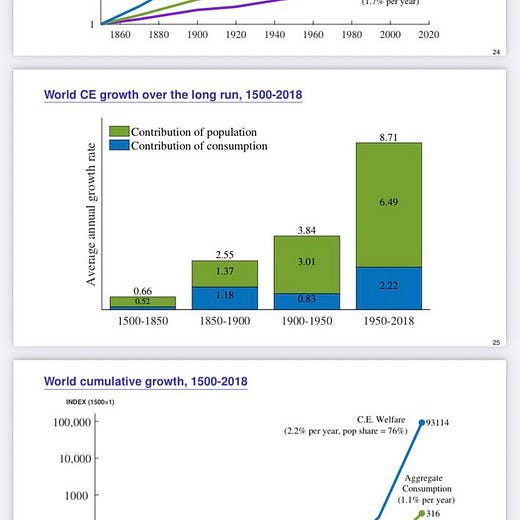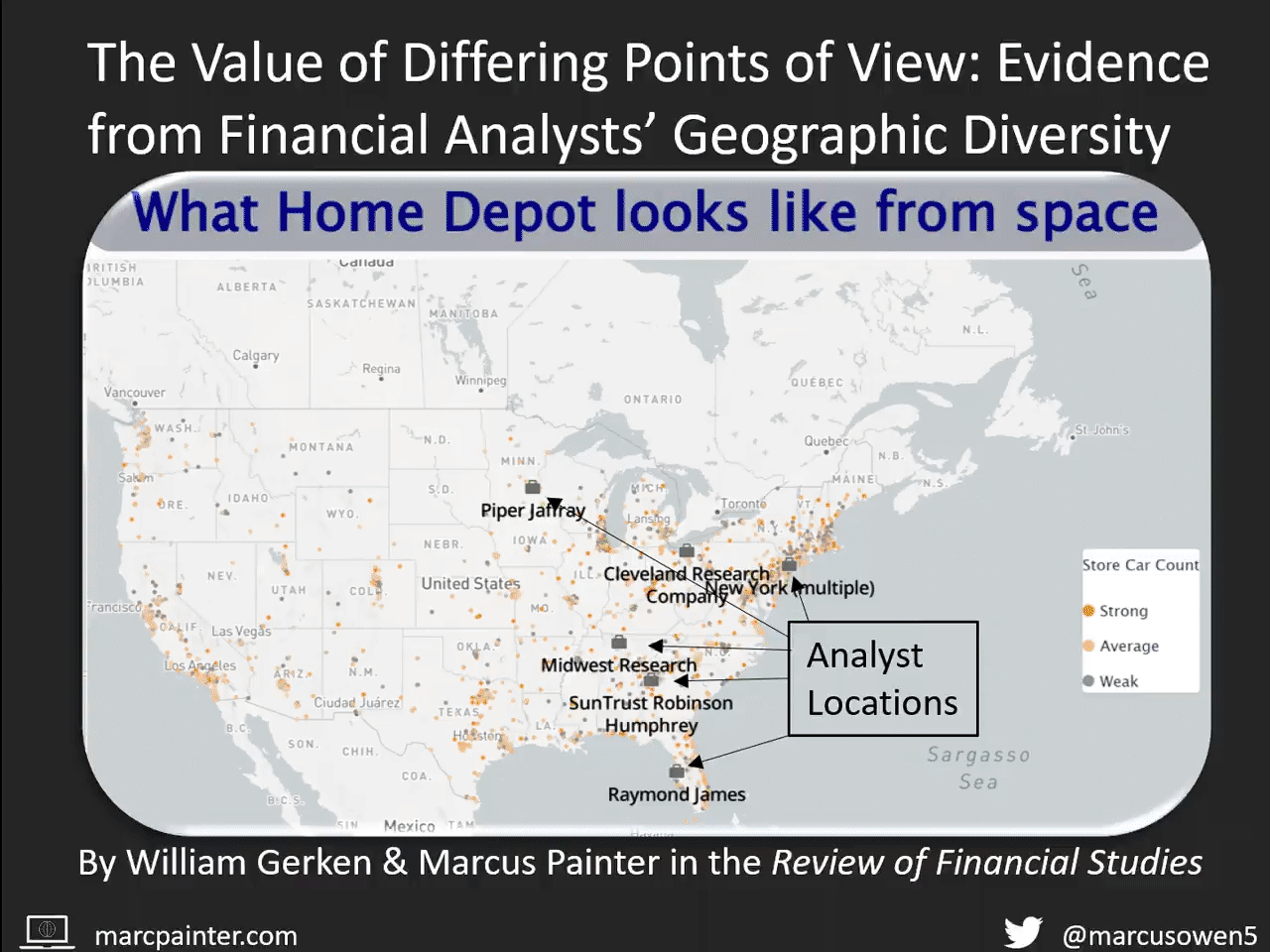Best of #econtwitter - Week of June 26, 2022 [2/2]
Jun 28, 2022
Welcome readers old and new to this week’s edition of Best of Econtwitter. Please submit suggestions — very much including your own work! — over email or on Twitter @just_economics.
This is part two of two.
Paper summaries

Alexander Berger@albrgr
Interesting set of slides from @ChadJonesEcon estimating that ~75% of global welfare growth over the past centuries has been population growth rather than income per capita growth: web.stanford.edu/~chadj/slides-…


12:32 AM · Jun 24, 2022
7 Reposts · 56 Likes

دومان بهرامیراد@rad1_db
ارزشهای جهانشمول یعنی اعمال استانداردهای اخلاقی مشابه و دادن وزن مشابه به منافع خودیها و غریبهها.
از شرکتکنندهها میپرسند 1000 دلار را چطور بین یک فرد غریبه و یک فرد خودی (مثلاً دوست یا خانواده) تقسیم میکنید؛ با فرض اینکه هر دو وضع مالی یکسانی دارند.
nber.org/papers/w30157

4:06 PM · Jun 20, 2022
2 Reposts · 41 Likes

Britta Glennon@BrittaGlennon
Thrilled that this paper (with @ravivmg @enrico_berkes @M_B_Ross Julia Lane and Bruce Weinberg) is out in @Nature today.
We find that women are much less likely to be credited with authorship (13% less) and inventorship (59% less) than men🧵

Mary Elizabeth @meharpist
Do you notice that there are fewer publications by women than men? A @nature paper shows that this is, in part, because women are less likely to be credited as authors for their scientific contribution @IRIS_UMETRICS @NYUWagner @M_B_Ross @BrittaGlennon
https://t.co/O7Z5EYva14
4:36 PM · Jun 22, 2022
61 Reposts · 197 Likes

Ethan Mollick@emollick
Many immigrants to the US give their kids generic "American" first names. This turns out to make a difference. For every ethnic group (besides Russian Jews), more generic names are linked to higher incomes. Social class only accounts for 1/3 of the effect. academia.edu/download/44421…

2:44 AM · Jun 20, 2022
38 Reposts · 188 Likes

Regina S. Baker, PhD@ReginaSBaker
See this figure illustrating the striking difference b/w the relationship between a state's historical racial regime (HRR) & poverty for Black Southerners vs. White Southerners. There is NO relationship between HRR and White poverty. This is not the case for Black poverty. 5/8

4:19 PM · Nov 23, 2021
18 Reposts · 85 Likes

Bruno Ferman@bruno_ferman
💡 Inference in difference-in-differences with few treated clusters 💡
Ferman and Pinto (2019) was published a couple of years ago, when I was not on Twitter. But I think it’s not too late to write a thread on it.
1/12

1:19 PM · Jun 22, 2022
64 Reposts · 310 Likes

Marcus Painter@MarcusOwen5
My research with Will Gerken, "The Value of Differing Points of View: Evidence from Financial Analysts’ Geographic Diversity," was just accepted @RevOfFinStudies !
To celebrate, I made this gif summarizing the paper
(I also already celebrated like a normal human person)

12:45 PM · Jun 22, 2022
11 Reposts · 60 Likes

Juan Estrada@juan___estrada
Happy to have participated in the @econometricsoc North American Summer Meeting with our paper On the Estimation of Social Effects with Observational Network Data and Random Assignment. The Spillovers and Peers Effects session contained excellent work. Some highlights here

5:01 PM · Jun 20, 2022
7 Reposts · 11 Likes

Natalia Emanuel@NataliaHEmanuel
Compulsory government procedures can be extremely annoying (hey DMV!) But violating them can be costly.
In an RCT with 30,000 people, @HelenHoPhD and I assess the causal impact of violating low-level compulsory government procedures.
2:03 PM · Jun 22, 2022
16 Reposts · 78 Likes
More: hospitals posting prices or not; after school tutoring RCT; early childhood inequality; corporate tax meta analysis; HANK via NNs; US wage data; markup estimation with distorted inputs
Interesting discussions

Eva Vivalt@evavivalt
This was surprising to me. 🧵 1/

Eva Vivalt @evavivalt
What do you think is the main factor stopping many researchers from conducting "long run" follow-ups (10 or 20 years later) of applied micro RCTs?
3:59 PM · Jun 22, 2022
1 Repost · 9 Likes

Nathaniel Hendren@nhendren82
+1 on this advice. It is OK for anyone to reject a request to review - rejecting a request with a list of 2-3 good alternates that might not be on the editor's radar is incredibly helpful (nearly equal value to doing the report...)

Jennifer Doleac @jenniferdoleac
@paulgp Highly relatable tweet!
In case you (or others reading this) haven’t already gotten this advice: sounds like it’s time to cap how many reports you allow on your plate at any one time. Just suggest alternatives (esp junior folks the editor might not know yet) when you say no.
1:19 AM · Jun 23, 2022
4 Reposts · 24 Likes

Anup Malani@anup_malani
Publishing in economics is BROKEN.
So when I got an email from INEXSY (@Prof_Riemann), a market for papers, I opened it.
Authors post abstract & figs of a paper; then journals see, DM for deets, & make publication offers,
I am NOT endorsing, but economists should model this.
11:24 AM · Jun 24, 2022
9 Reposts · 55 Likes

Philip Mulder@Philipcheesy1
@anup_malani @Prof_Riemann I think you could take the system one step further. Author submits to market, market collects reports from well-paid referees, and reports + paper are reviewed by group of 5-10 journals. Then journals bid for papers
12:44 PM · Jun 24, 2022
4 Likes

Jonathan Cohen@jonpcohen
Easy mitzvah: send a comment to the Census against the proposed Census wage rounding.
I pulled a couple of specific examples from @BitsyPerlman's useful thread.
https://t.co/0PFq4IdG4h

Gabriel Demombynes @gdemom
@arindube The Census Bureau is looking for comments through July 15, 2022 (users should provide comments to ADDP.CPS.PUF.List@census.gov).
5:29 PM · Jun 23, 2022
2 Likes

Uri Simonsohn@uri_sohn
If a book made you want to study economics (undergrad or PhD) . What book was it?
12:14 PM · Jun 24, 2022
16 Reposts · 193 Likes

